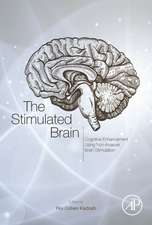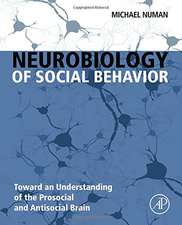Observation Oriented Modeling: Analysis of Cause in the Behavioral Sciences
Autor James W. Griceen Limba Engleză Hardback – 16 mai 2011
- Describes the problems that statistics are meant to answer, why popularly used statistics often fail to fully answer the question, and how OOM overcomes these obstacles
- Chapters include examples of statistical analysis using OOM
Preț: 489.23 lei
Preț vechi: 698.67 lei
-30% Nou
Puncte Express: 734
Preț estimativ în valută:
93.64€ • 101.75$ • 78.71£
93.64€ • 101.75$ • 78.71£
Carte tipărită la comandă
Livrare economică 15-29 aprilie
Preluare comenzi: 021 569.72.76
Specificații
ISBN-13: 9780123851949
ISBN-10: 0123851947
Pagini: 256
Ilustrații: black & white illustrations, black & white tables, figures
Dimensiuni: 152 x 229 x 18 mm
Greutate: 0.56 kg
Editura: ELSEVIER SCIENCE
ISBN-10: 0123851947
Pagini: 256
Ilustrații: black & white illustrations, black & white tables, figures
Dimensiuni: 152 x 229 x 18 mm
Greutate: 0.56 kg
Editura: ELSEVIER SCIENCE
Public țintă
Research/experimental psychologistsCuprins
Foreword by Paul Barrett
Acknowledgments
Chapter 1: Introduction
Chapter 2: Data at its core
Chapter 3: Rotating deep structures
Chapter 4: Modeling with deep structures
Chapter 5: Statistics and Null Hypothesis Significance Testing
Chapter 6: Modeling and inferential statistics
Chapter 7: Models and effect sizes
Chapter 8: Measurement and additive structures
Chapter 9: Cause and Effect
Chapter 10: Coda
Acknowledgments
Chapter 1: Introduction
Chapter 2: Data at its core
Chapter 3: Rotating deep structures
Chapter 4: Modeling with deep structures
Chapter 5: Statistics and Null Hypothesis Significance Testing
Chapter 6: Modeling and inferential statistics
Chapter 7: Models and effect sizes
Chapter 8: Measurement and additive structures
Chapter 9: Cause and Effect
Chapter 10: Coda
Recenzii
"Observation Oriented Modeling… introduces readers to an alternative methodology that can enhance the analysis of data. It also reminds readers that fundamental questions related to cause and effect and the interpretation of data extend beyond the conventional randomized control group design. Although one would hope for a greater review of the mathematical foundations of these statistics, the overall tone of the book can inspire readers to further delve into these complex matters."--PsycCRITIQUES
"James Grice’s timely and important book is a methodological tour de force. It marshalls a number of telling criticisms of the traditional variable-centered approach to behavioral research and offers a methodologically coherent alternative in the form of Observation Oriented Modeling. Appropriately grounded in a realist philosophy, observation oriented modeling is a person-centered methodology that enables the researcher to effectively test causal hypotheses and theories by using purpose-constructed software. The book will be an instructive companion for graduate students and professional researchers alike. Behavioral researchers need to be apprised of the limitations of their orthodox methodology and provided with an alternative that promises to advance our psychological knowledge of people. Grice’s ground-breaking book does both in a highly accomplished fashion."--Professor Brian Haig, University of Canterbury
"A learned, detached examination of the well springs of modern psychology. As a university discipline, psychology came into its own in the early part of the twentieth century in the shadow of the positivism of the Vienna Circle. To the extent that psychology has been colored by the shallowness of positivism, it has been disadvantaged in both theory and in practice. A philosophy which effectively limits scientific inquiry to description and prediction has little explanatory power. Grice shows clearly the limitations of such a method and argues for a return to the common sense realism of Aristotle and its recognition of the explanatory value of the metaphysical concept of human nature and irs role in causal explanation. Rarely since the work of Mortimer Adler has there been such an indepth study of the philosophical bias of much contemporary research in psychology."--Jude P. Dougherty, Editor. Review of Metaphysics
"James Grice’s timely and important book is a methodological tour de force. It marshalls a number of telling criticisms of the traditional variable-centered approach to behavioral research and offers a methodologically coherent alternative in the form of Observation Oriented Modeling. Appropriately grounded in a realist philosophy, observation oriented modeling is a person-centered methodology that enables the researcher to effectively test causal hypotheses and theories by using purpose-constructed software. The book will be an instructive companion for graduate students and professional researchers alike. Behavioral researchers need to be apprised of the limitations of their orthodox methodology and provided with an alternative that promises to advance our psychological knowledge of people. Grice’s ground-breaking book does both in a highly accomplished fashion."--Professor Brian Haig, University of Canterbury
"A learned, detached examination of the well springs of modern psychology. As a university discipline, psychology came into its own in the early part of the twentieth century in the shadow of the positivism of the Vienna Circle. To the extent that psychology has been colored by the shallowness of positivism, it has been disadvantaged in both theory and in practice. A philosophy which effectively limits scientific inquiry to description and prediction has little explanatory power. Grice shows clearly the limitations of such a method and argues for a return to the common sense realism of Aristotle and its recognition of the explanatory value of the metaphysical concept of human nature and irs role in causal explanation. Rarely since the work of Mortimer Adler has there been such an indepth study of the philosophical bias of much contemporary research in psychology."--Jude P. Dougherty, Editor. Review of Metaphysics








